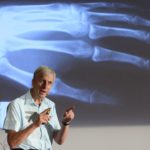Beyond medicine: What will AI-augmented humans be like
For Professor Kevin Warwick, a cybernetics expert and Emeritus Professor at Coventry and Reading Universities, the future of humans is literally tied to artificial intelligence, with technologies that will allow us to link our brains to machines to augment our physical and mental abilities. He recently sat down for an interview with OpenMind, BBVA's knowledge community, to share some of his insights into this fascinating topic.

A man suffering from Parkinson’s disease appears on screen. Already at an advanced stage of the disease, he can no longer keep his arms from violently trembling and needs help to stand up and walk. A few seconds later, we see the same patient after having a neurostimulator implanted by Professor Alim Louis Benabid’s team. As the implant begins stimulate the man’s brain, his tremors cease. He repositions himself in his chair to make himself comfortable. He rises his right arm, and moves his fingers in a controlled manner. Then his left arm. He stands up. Walks around the room.
Deep Brain Stimulation is one of the emerging applications that are bringing electrode implantation out of the realm of science fiction, enabling what may soon be effective treatments against neurodegenerative diseases. But for the OpenMind author Kevin Warwick it's only a matter of time before humans tie their brains to AI-powered systems to boost their abilities far beyond what medical applications are currently exploring.
In the interview with OpenMind, Warwick analyzes the future of artificial intelligence applied to human beings. "For me, humans enhancing themselves with AI is going to be the way we have to go. The alternative —having machines that are more intelligent than humans— is a very, very dangerous scenario.” Infallible memory, brain-to-brain communication, body extensions in objects located hundreds of miles away, new senses such as echolocation... these are some of the possibilities that the professor envisages.
“We will understand the world around us in a much more complex way, maybe we’ll understand in more dimensions —which is an advantage of AI— and we’ll be able to travel into space, which we can’t at the moment because we think in 3-D, it really restricts our thinking.”
Click here to read the complete interview with the professor on OpenMind’s website.

Kevin Warwick during the OpenMind and Diario Sur's forum - Diario Sur